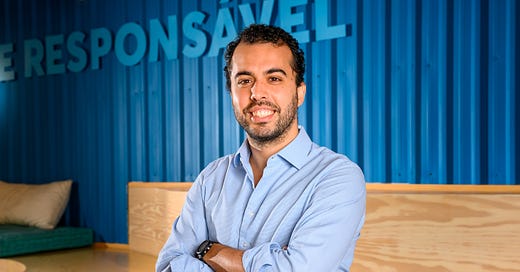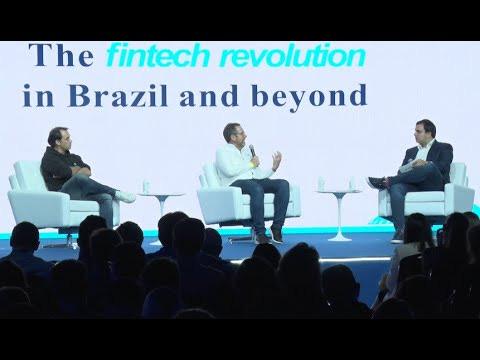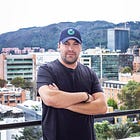This article is part of Fintech Leaders, a newsletter with almost 60,000 dreamers, entrepreneurs, investors, and students of financial services. I invite you to share and sign up! And, if you enjoy this conversation, please consider leaving a review on Apple Podcasts, Spotify, or wherever you get your shows so more people can learn from it.
I sat down with Pedro Conrade, CEO/Co-Founder of Neon, one of the largest digital banks in Brazil and Latin America. We chatted on stage in Sao Paulo, Brazil at the Gilgamesh Ventures Summit, an annual meeting where we gather Limited Partners, Founders, Co-Investors, and friends for a series of events and discussions about the future of financial services.
Serving almost 20 million clients, Neon is one of the largest fintech companies in the Americas and, without a doubt, Pedro is amongst the most inspiring figures I know. Every time I talk to him, I come out with a shot of motivation and positivity.
In this episode, we discuss:
A Catalyst Moment - How an overdraft fee infuriated Pedro and inspired him to launch Neon
At age 23, Pedro was going to university and had a monthly salary of only $300. One day he woke up to find out his bank had charged him an atrocious overdraft fee, which led him to realize he was paying almost $400 a year for basic financial services. These negative experiences drove Pedro to go out and launch Neon to prioritize a banking model with no monthly fees for users, emphasizing simplicity and transparency in financial operations. Eight years ago, the concept of FinTech wasn't prevalent in Brazil and he saw an opportunity to innovate in a space that was still nascent. Pedro was influenced by Simple Bank in the US, one of the pioneers of digital banking. He saw potential in the idea of combining an app with a prepaid debit card that showed transactions, thinking this would be a straightforward yet transformative solution for Brazilian consumers.
Why major crises and tough moments helped build a more resilient company
"We had 70,000 active users at that time. It was very stressful, because one day, Friday morning, I received a call that said: Hey, something happened. You have until Monday to figure out another partner and just switch all the accounts, everything. You have to find another bank partner"
Neon today is one of Brazil’s most important financial institutions with almost 20 million customers. The road to get there hasn’t been easy and they’ve gone through some high highs and low lows. Pedro shared a particular instance when he woke up one day, only to learn that his partner bank had been shut down. Neon started with a bank partnership with a small bank from Minas Gerais, Brazil. This bank faced an issue with the central bank and was forced to cease operations, crippling Neon's model. With the bank's shutdown, Neon had a mere three days to find another banking partner and transfer all accounts and functionalities. Despite the enormous pressure, with the support of their team and lawyers, Neon successfully transitioned to a new partner and had the bank live again by Monday. The crisis forged Neon's resilience, making the team more effective and tenacious.
CosmoCash: Step into the universe of global finance with CosmoCash. Our platforms are built to serve, whether you're in the heart of the US or the vibrant corners of the world. Pioneering fintech solutions bridge cultures, currencies, and continents. Your dreams, our mission. Venture with confidence in a world where CosmoCash connects you to every opportunity. #CosmoConnects
Neon’s M&A strategy – insights from five company acquisitions
“I'm a huge fan of doing great acquisitions. But it's very tough to find the perfect match, because it's a big responsibility for us and also for the entrepreneurs coming in.”
Pedro values acquisitions but stresses the importance of finding the perfect match and investing a lot of time in the post-merger integration. Neon's past acquisitions can be categorized into two: those made to obtain necessary licenses (e.g., brokerage house and bank license) and those driven by the inherent business value of the acquired company. He seeks great teams led by passionate entrepreneurs that need and could benefit from additional resources, like a larger customer base or a stronger balance sheet.
Neon’s first acquisition was full of mistakes because they attempted to integrate the acquired company too rapidly, which burdened the new team with Neon's bureaucratic structures. However, through trial and error, they've refined their integration strategy for subsequent acquisitions. Neon operates in a business unit structure, where each unit runs independently with its own set of C-level executives and is responsible for its P&L. Acquired companies are typically incorporated as new business units. Neon takes over specific operational tasks, like fundraising and compliance, allowing the new business unit to focus on growth. The results have been very positive for Neon and entrepreneurs from these acquisitions often go on to lead other verticals of the company.
Reflections on Raising Venture Capital
Pedro reminds founders that raising venture capital is not a guaranteed process. Founders should not assume that they'll be able to secure the necessary funds, as there are many startups competing for limited investor attention. There's an irony in the fundraising world; the less dependent you are on external capital, the more attractive you become to potential investors. If you can find a business niche that requires minimal initial investment, it can make your company more appealing to venture capital. Pedro's personal experience has shown him that securing funding isn't typically a result of a single pitch meeting, it's about nurturing relationships over time, consistently demonstrating execution against promises, and building trust. For instance, he met with BBVA for over three years before they decided to invest, and his approach of delivering on promises established his credibility.
And many more company-building lessons
“When you have 2,000 employees, it's very easy to feel comfortable with six-month deadlines for everything, right? And then we talk to a startup that's starting right now and they say, 'Hey, we launched this in six days'… and I think, oh f*#k, we need to change.”
Want more podcast episodes? Join me and follow Fintech Leaders today on Apple, Spotify, or your favorite podcast app for weekly conversations with today’s global leaders that will dominate the 21st century in fintech, business, and beyond.
Previous Episodes You May Enjoy:
Video Highlights You Will Definitely Like:
Miguel Armaza is Co-Founder & General Partner of Gilgamesh Ventures, a seed-stage investment fund focused on fintech in the Americas. He also hosts and writes the Fintech Leaders podcast and newsletter.


























Share this post